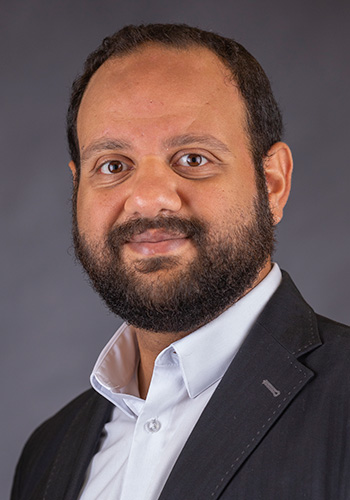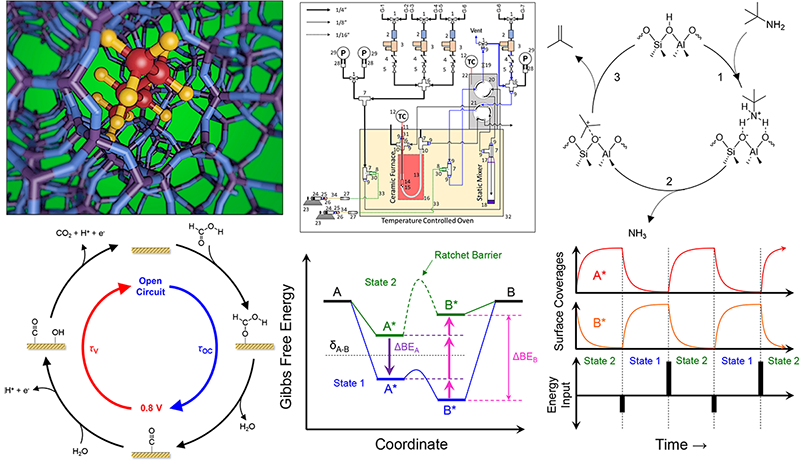
Dr. Omar Abdelrahman
Associate Professor
Prof. Abdelrahman is a chemical engineer who studies the dynamic evolution of chemical kinetics and thermodynamics at the interface of solid catalysts. Growing up in the Middle East (United Arab Emirates), he received his B.Sc. in chemical engineering (American University of Sharjah, 2011) before moving to upstate New York for his PhD in chemical engineering (Syracuse University, 2016), followed by a postdoctoral position at the University of Minnesota. Between 2018 and 2023, Prof. Abdelrahman was an assistant professor at the University of Massachusetts Amherst in the Department of Chemical Engineering. Currently, he is an associate professor of chemical engineering at the University of Houston, social media director for the Catalysis & Reaction Engineering Division of AIChE, American Chemical Society CATL (Catalysis Science & Technology) executive board member, and an early-career editorial board member of the Journal of Catalysis. Prof. Abdelrahman is a recipient of the National Science Foundation CAREER award (2021) and has been recognized as one of AIChE’s 35 Under 35 Young Trailblazer in Chemicals & Materials (2023).
The chemical catalysis and reaction engineering lab led by Prof. Abdelrahman is focused on understanding and manipulating reaction interfaces existing at the intersection of fluid and catalyst phases. The research group leverages a wide array of experimental techniques to understand how external energetic stimuli alter reaction mechanisms, kinetics, and thermodynamics of both thermo and electro-chemical transformations proceeding on heterogeneous catalyst surfaces. As a leading member of the DOE Center for Programmable Energy Catalysis, Dr. Abdelrahman has led the effort to develop the concept of programmable catalysis, where energetic oscillations of a catalytic material accelerate the turnover rate at which chemical transformations proceed. Research in the group additionally focuses on the reaction environment surrounding catalytic surfaces, with an emphasis on understanding and controlling non-ideal thermodynamic environments relevant to renewable chemical transformations. The group is also committed to advancing accessible and affordable science by developing and disseminating experimental designs that lower the barrier to entry in catalysis research.
DYNAMIC ELECTROCATALYSIS
Dynamic electrocatalysis, the delivery of applied potential oscillations to an electrochemical electrode at precisely controlled frequencies, greatly enhances electrocatalytic activity and selectivity relative to static counterparts. Acceleration of the catalytic cycle through this dynamic approach is maximized at a unique range of frequencies, proposed to be in resonance with the kinetic timescales of individual surface reactions. Through microkinetic modeling, computational calculations, and experimental kinetics, we are developing and researching the ability to accelerate the activity of existing materials through periodic energetic oscillations applied directly to the catalytic surface.
PROGRAMMABLE CATALYSIS
Merging the area of heterogeneous catalysis and microelectronics, we are controlling the electronics of metal atoms in real time to create active sites that experience continuous energetic fluctuations. The real time and in situ control of metal active site electronics allows for the programmable modulation of thermocatalytic activity.
CONFLUENCE OF CATALYTIC KINETICS AND THERMODYNAMICS
The reaction microenvironment surrounding a catalytically active site provides a rich dial through which to tune catalytic activity and selectivity for all chemical transformations. By combining surface sensitive techniques relevant to understanding chemical kinetics and thermodynamics on catalytic surfaces, we are interested in understanding the confluence of the two energetic domains, and how they can be manipulated to afford enhanced catalytic performance.
ADSORPTION THERMODYNAMICS
Understanding the energetics associated with adsorption phenomena on solid surfaces is core to the design of heterogeneous catalysts. While enthalpic contributions are relatively well understood, the mobility of adsorbates on the surface as captured through entropy is far more elusive. We develop experimental techniques that allow us to more directly measure adsorbate entropy and mobility in the porous networks of high surface area solids critical to catalytic technologies.
• Graduate students: Ajibola Lawal, Atharva Burte, Benjamin Page, Han Chen, Faviola Villariny-Rosado
AIChE 35 Under 35 Young Trailblazer in Chemicals & Materials, 2023
Lilly Fellowship for Teaching Excellence, University of Massachusetts Amherst, 2023
Pioneer of Catalysis & Reaction Engineering, AIChE-CRE Division, 2022
Keynote speaker for the Southwest Catalysis Society summer symposium, 2021
National Science Foundation CAREER Award, 2021
Catalysis Center for Energy Innovation Achievement Award, 2019
Best Paper in Session, AIChE Annual Fall Meeting, 2017
All-University Doctoral Prize, Syracuse University, 2017
Outstanding Achievement Award in Graduate Study, Syracuse University, 2017
Best Paper in Session, AIChE Annual Fall Meeting, 2016
Kokes Award, North American Catalysis Society, 2015
Grand Prize Winner of Nunan Research Day, Syracuse University, 2014
AIChE Graduate Student Travel Award, Catalysis and Reaction Engineering Division, 2014
Selected Publications
- A. Lawal and O. A. Abdelrahman, “Paired Site Characterization in Aluminosilicate Zeolites through Limited Alkylammonium Stability.” J. Phys. Chem. C [DOI], 2023
- F. Villariny-Rosado and O. A. Abdelrahman, A dynamic window of opportunity for accelerated electrochemistry.”, Chem Catalysis 2, 3273-3274 [DOI], 2022
- T. M. Onn, S. R. Gathmann, S. Guo, S. S. Solanki, A. Walton, B. J. Page, G. Rojas, M. Neurock, L. C. Grabow, K. A. Mkhoyan, O. A. Abdelrahman, C. D. Frisbie, and P. J. Dauenhauer, “Platinum Graphene Catalytic Condenser for Millisecond Programmable Metal Surfaces.” Journal of the American Chemical Society, 144, 22113-22127 [DOI] , 2022
- Y. Ji, S. Batchu, A. Lawal, D. G. Vlachos, S. Caratzoulas, R.J. Gorte, and O. A. Abdelrahman, “Selective Dehydra-decyclization of Cyclic Ethers to Conjugated Dienes over Zirconia.” Journal of Catalysis 410, 10-21 [DOI], 2022
- G. Kumar, L. Ren, Y. Pang, X. Li, H. Chen, P.J. Dauenhauer, M. Tsapatsis, and O. A. Abdelrahman, “Acid Sites of Phosphorus-Modified Zeosils.” ACS Catalysis, 11, 9933–9948 [DOI], 2021
- H. Chen and O. A. Abdelrahman, “Cooperative Adsorption: Solvating the Hofmann Elimination of Alkylamines.” ACS Catalysis 11, 6416-6430 [DOI] , 2021
- J. Gopeesingh, M. A. Ardagh, M. Shetty, S. Burke, P. J. Dauenhauer, and O. A. Abdelrahman, “Resonance-Promoted Formic Acid Oxidation via Dynamic Electrocatalytic Modulation” ACS Catalysis 10, 9932-9942 [DOI], 2020
- J. Qi, J. Resasco, H. Robatjazi, I. B. Alvarez, O. A. Abdelrahman, P. J. Dauenhauer, and P. Christopher, “Dynamic Control of Elementary Step Energetics via Pulsed Illumination Enhances Photocatalysis on Metal Nanoparticles.” ACS Energy Letters 5, 3518-3525 [DOI], 2020
- Y. Ji, A. Lawal, A. Nyholm, R. J. Gorte, and O. A. Abdelrahman, “Dehydra-decyclization of tetrahydrofurans to diene monomers over metal oxides.” Catalysis Science and Technology 10, 5903-5912 [DOI], 2020
- P. J. Dauenhauer and O. A. Abdelrahman, “A Universal Descriptor for the Entropy of Adsorbed Molecules in Confined Spaces.” ACS Central Science 4, 1235-1243 [DOI], 2018